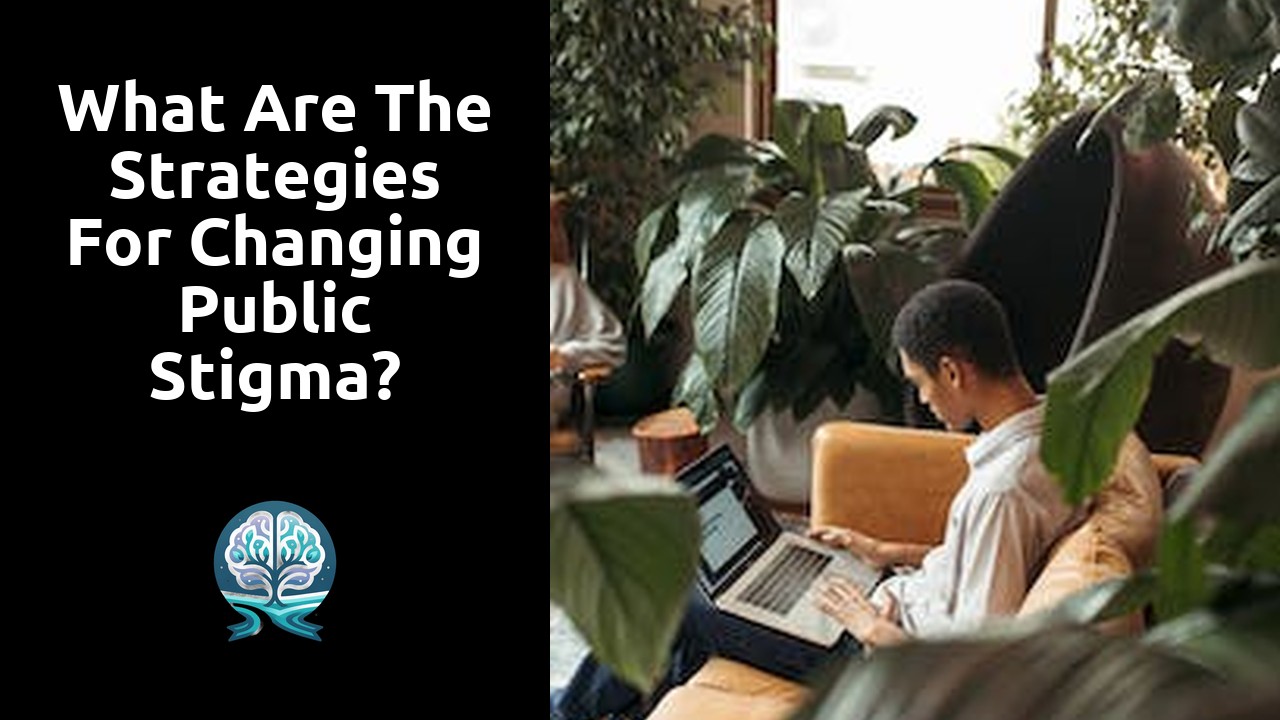What are the strategies for changing public stigma?

Mental Health Awareness Efforts
Mental health awareness efforts play a crucial role in challenging and changing public stigma surrounding mental health issues. Raising awareness about the prevalence and impact of mental health conditions helps to normalize conversations and destigmatize seeking help. Through educational campaigns, community events, and social media initiatives, individuals and organizations can contribute to changing public perceptions and attitudes towards mental health.
By highlighting the importance of mental well-being and emphasizing the fact that mental health conditions are common and treatable, awareness efforts help to combat negative stereotypes and misconceptions. Encouraging open discussions about mental health, promoting help-seeking behaviours, and providing resources for support can contribute to a more accepting and understanding society. Ultimately, increasing awareness about mental health not only benefits individuals struggling with mental health issues but also fosters a more compassionate and inclusive community for everyone.
Reducing Misconceptions and Discrimination
Reducing misconceptions and discrimination surrounding mental health is a critical aspect of addressing public stigma. One effective strategy is education through various channels such as schools, workplaces, and media platforms. By providing accurate information about mental health conditions, symptoms, and treatment options, individuals can gain a better understanding and challenge existing stereotypes.
Moreover, fostering personal connections and empathy towards those experiencing mental health challenges can also play a significant role in reducing stigma. Encouraging open conversations and promoting supportive environments can help break down barriers and stereotypes that fuel discrimination. By emphasizing shared humanity and highlighting the importance of compassion, individuals can develop a more inclusive and understanding attitude towards mental health issues.
Targeted Communication Strategies
Targeted communication strategies play a crucial role in changing public stigma surrounding mental health issues. One effective approach is through the use of personal stories and testimonials. By sharing real-life experiences of individuals who have faced mental health challenges, we can humanize the issue and help others develop empathy and understanding. These narratives can help break down stereotypes and misconceptions that contribute to stigma, creating a more compassionate and supportive environment.
Another key strategy is to engage with diverse media outlets to reach a wider audience. Utilizing various platforms such as social media, online blogs, and traditional print media can help disseminate accurate information and counteract misinformation and myths surrounding mental health. By collaborating with journalists, influencers, and content creators, we can amplify messages of acceptance and inclusion, fostering a more positive and informed dialogue around mental health issues.
Addressing Misinformation and Myths
Addressing misinformation and myths surrounding mental health is crucial in combating public stigma. Providing accurate information through various channels, such as social media, educational campaigns, and public forums, can help correct misconceptions that contribute to stigmatizing attitudes. It is important to engage with the public in an accessible and relatable manner to dispel false beliefs and promote understanding of mental health issues.
Using evidence-based facts and statistics can be a powerful tool in challenging deeply ingrained myths about mental health. By presenting research and data in a clear and digestible way, it is possible to undermine the foundation of stigma built on misconceptions. Additionally, fostering open dialogues with individuals who hold stigmatizing views can facilitate a shift in attitudes towards greater empathy and acceptance of those living with mental health conditions.
Peer Support Networks
Peer support networks play a pivotal role in combating public stigma surrounding mental health issues. These networks offer a platform for individuals with lived experiences to connect, share stories, and provide mutual support. By fostering a sense of community and understanding, peer support networks break down barriers and promote empathy towards those facing mental health challenges.
Moreover, peer support networks empower individuals to speak openly about their struggles without fear of judgment or discrimination. Through shared experiences and guidance, members of these networks can offer practical advice, coping strategies, and emotional support to one another. This reciprocal exchange of support not only helps combat stigma but also promotes a culture of inclusivity and acceptance.
Providing Empathy and Understanding
Providing empathy and understanding towards individuals facing mental health challenges can significantly contribute to reducing public stigma. This approach involves actively listening to their experiences without judgment and offering a supportive environment where they feel heard and validated. By recognizing the validity of their emotions and struggles, we can foster a sense of connection and solidarity that helps break down barriers created by stigma.
Moreover, demonstrating empathy and understanding can help reshape negative attitudes towards mental health issues within the public sphere. When individuals are met with compassion and kindness, it can lead to increased awareness and acceptance of diverse experiences. By creating spaces that prioritize empathy, we can challenge stereotypes and misconceptions surrounding mental health, ultimately paving the way for a more inclusive and supportive society.
FAQS
How can mental health awareness efforts help in changing public stigma?
Mental health awareness efforts can help educate the public about mental health conditions, reduce misconceptions, and promote understanding and empathy towards individuals facing mental health challenges.
What is the importance of reducing misconceptions and discrimination in changing public stigma?
By reducing misconceptions and discrimination, we can create a more inclusive and supportive environment for individuals with mental health conditions, ultimately helping to break down the barriers of stigma.
How can targeted communication strategies be effective in changing public stigma?
Targeted communication strategies can help address misinformation and myths surrounding mental health, promote accurate and positive messages, and encourage open conversations about mental health.
What role do peer support networks play in changing public stigma?
Peer support networks provide individuals with a sense of community, understanding, and empathy, helping to reduce feelings of isolation and shame often associated with mental health conditions.
How can providing empathy and understanding help in changing public stigma?
By providing empathy and understanding, we can create a more compassionate and accepting society, where individuals feel supported and valued regardless of their mental health status.
Related Links
How can we reduce stigma in the workplace?What are the ways of reducing stigma?